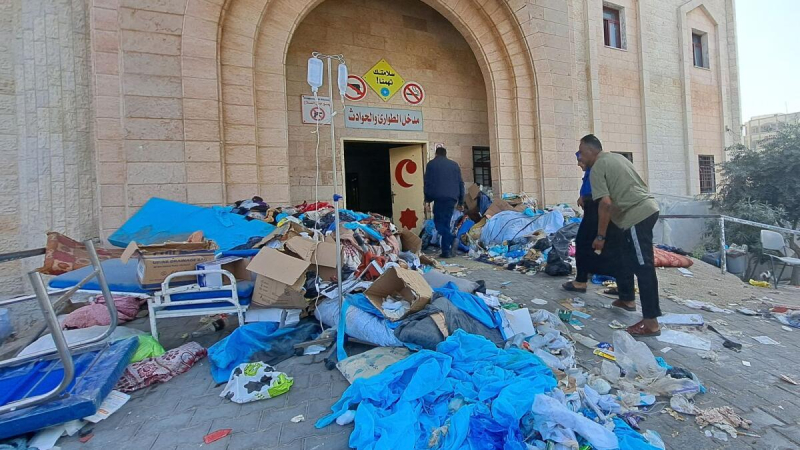- Tarique urges people to help restart democracy, elected reps solve problems |
- $1 for Nature, $30 for Its Destruction: UN Warns |
- Madhyanagar Upazila in limbo four years after formation |
- BNP leader injured in gun shot in Keraniganj |
- Tarique’s 1st day 16-hours campaign runs till 5am Friday |
UN decries 'systematic' blocking of aid to north Gaza hospitals

Israel is consistently blocking humanitarian convoys into northern Gaza, making it increasingly difficult tobring desperately-needed fuel and other aid to hospitals there, the UnitedNations said Friday.
After planning aid missions to the north, UN agencies said their convoys weresubjected to slow and unpredictable inspections and then a near-systematicrefusal from the Israeli side to proceed.
"Operations in the north (are) increasingly more complicated," Andrea DeDomenico, head of the UN aid agency OCHA's office in the occupied Palestinianterritories.
Speaking from Jerusalem to a virtual press briefing, he described howdetailed coordination was required with a network of checkpoints, and "theIsraelis have systematically, or quasi-systematically, refused" to let them through.
In recent days, he said the agency had had three missions partially approved out of 21 requested.
Lucia Elmi, special representative for the UN children's agency UNICEF in the Palestinian territories, also lamented that "we can't get sufficient aid in".
"The inspection process remains slow and unpredictable, and some of thematerials we desperately need remain restricted, with no clear justification," she said.
- 'Inhumanity' -
De Domenico said the Israeli military was particularly wary about allowing fuel into the north, and especially to hospitals.
"They have been very systematic to not allow us to support hospitals, which is something that is reaching a point of a level of inhumanity that for me isbeyond comprehension," he said.
The UN's World Health Organization meanwhile said that it had finally on Thursday managed to reach Al-Shifa hospital in the north for the first timein over two weeks, after seven failed attempts.
WHO chief Tedros Adhanom Ghebreyesus said on X, formerly Twitter, that themission allowed for the delivery of desperately-needed aid, including 9,300 litres of fuel.
He hailed that "the team reported that Al-Shifa, previously Gaza's premier hospital, has (partially) re-established services".
The hospital, which WHO described as "a death zone" after it largely ceased operations following raids and occupation by Israeli troops in November, nowhas 60 medical staff, Tedros said.
It also has "a surgical and medical ward with 40 beds, an emergency department, four operating theatres, basic emergency obstetric andgynaecologic services".
Hospitals, protected under international humanitarian law, have repeatedly been hit by alleged Israeli strikes in Gaza since the war erupted.
The Israeli military accuses Hamas of having tunnels under hospitals andusing the medical facilities as command centres, a charge denied by the Islamist group.
- 'Disaster of epic proportions' -
The war began when Hamas launched its October 7 attack, which resulted inabout 1,140 people killed in Israel, mostly civilians, according to an AFPtally based on official figures.
Militants also took around 250 hostages, 132 of whom Israel says remain inGaza, including at least 25 believed to have been killed.
Israel responded with a relentless military campaign that the health ministryin Hamas-run Gaza says has killed more than 23,700 people, mostly women andchildren.
Only 15 of Gaza's 36 hospitals are even partially functioning, most of themin the south.
The UN has long described desperate scenes in the few barely functioning hospitals remaining in the north, facing severe shortages of food, cleanwater, medicines and fuel.
While the partial resumption of services at Al-Shifa was good news, Tedros emphasised that it meant "the consumption of fuel is much higher, and the need for medical supplies is increasing".
Elmi meanwhile stressed the urgency of allowing more aid through, especially for Gaza's children, reports BSS.
"Children in Gaza are running out of time, while most of the life saving humanitarian aid they desperately need remains stranded between insufficientaccess corridors and protracted layers of inspections," she said.
"Mounting needs and a constrained response is a formula for a disaster ofepic proportions."

